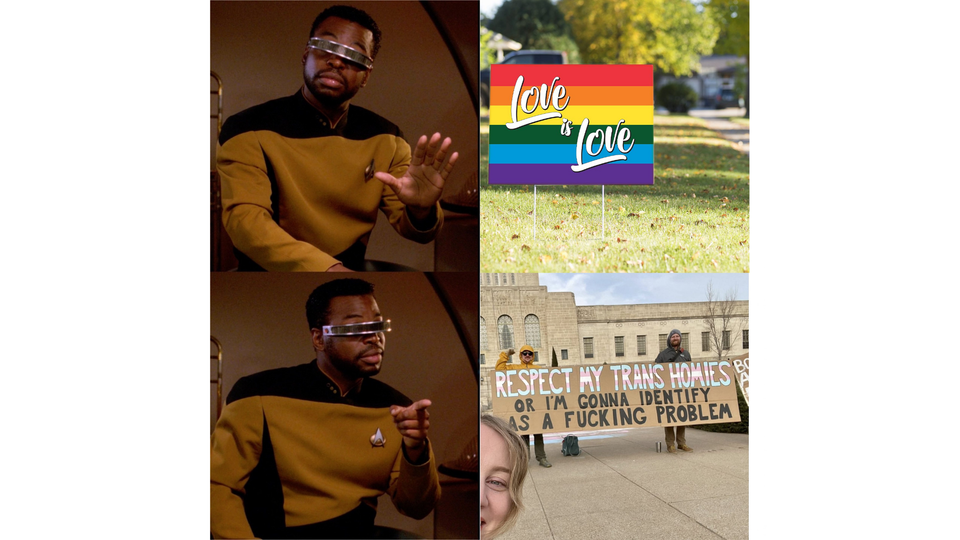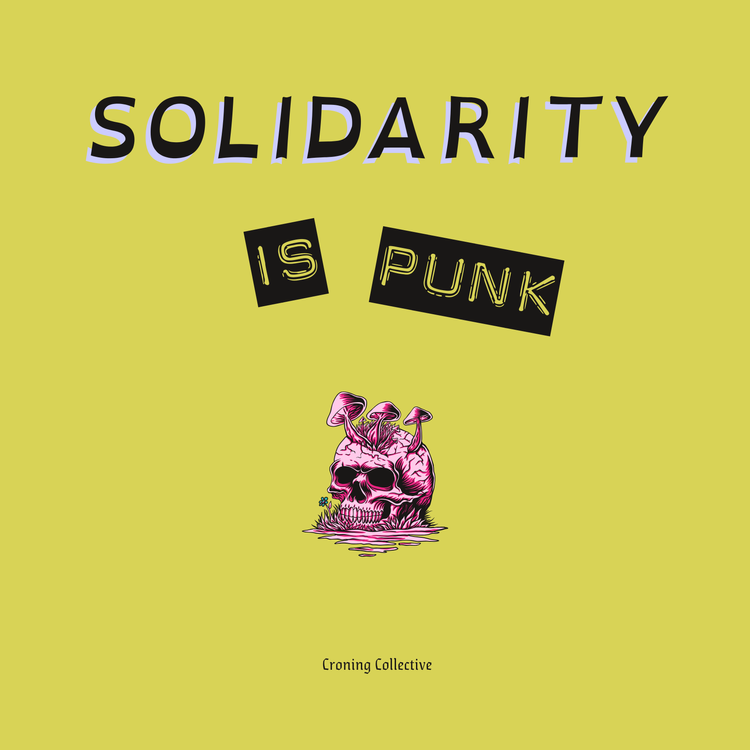The Queers Are Not OK. And Neither Are Their Moms.

My plan for Pride Month was to offer collaborators some ways to support queer liberation that go beyond “Love Is Love.” I wasn’t thinking about anything hard—just next steps, kind of tiptoeing into direct action. I wrote something about not being a dick at Pride and I figured I would build from there.
Turns out I couldn’t quite do it, because I need for people who care about LGBTQ+ people to start doing hard things.
In case you don’t know, June has been a terrible month at the Supreme Court, starting with United States v. Skrmetti, continuing with Medina v. Planned Parenthood South Atlantic, and ending with Mahmoud v. Taylor. Now, I know we’re all intersectional here, so we understand that the Supreme Court’s decision to limit universal injunctions will effect LGBTQ people, and we know that there ruling in Medina endangers the health—endangers the lives—of a whole lot of straight folks. I am focusing on the implications of the latest SCOTUS session for queer people because this is where I focus a lot of my attention as an organizer and activist. (Mahmoud is also an assault on public education, which is very much my lane.)
While I don’t think I’ve ever explicitly defined my theory of croning, an essential aspect of being a crone is—to me—being a good ancestor. Being Gen X has meant living forever in the shadow of the Baby Boom. It has meant watching people my parents’ age shit on kids and destroy the future. Ronald Reagan was the arch-enemy during my teen years, and Ronald Reagan walked so that Donald Trump could run. Trump is a lot of things, but one of those things is the end result of a project Mitch McConnell quietly plugged away at for decades, [1] and that project was capturing the judicial branch for conservatives.
This brings us back to the SCOTUS term that just ended. Adults who identify as LGBTQ make up less than 10% of the United States population. These people have already lost rights under the current administration and have been subjected to rising levels of homophobic and transphobic rhetoric, discrimination, and violence.
Among kids between the ages of 8 and 18, somewhere between 7% and 9% identify as LGBTQ. More than half of these kids are BIPOC. They are all at risk for family rejection, bullying, homelessness, sex trafficking, and suicidality at higher rates than their straight and cisgender peers.
What I am trying to say is that queer people are in danger and we need help—help that goes beyond being a passive ally. I know that all the news is overwhelming and most of it is bad, so I’ve created a primer on the SCOTUS cases I understand best. I’ve also offered some suggestions about how to become collaborators in the fight for queer liberation.
TL:DR: Please do what you can when you can do it. I am not asking you to fix everything. I’m not asking you to fix anything. I’m just asking you to be aware of the struggle and pitch in where you can. As I said at the outset, I’m focusing on the issues that I’m most passionate about and where I feel I have the most to contribute. I care a lot about birthright citizenship—also newly weakened by SCOTUS—but what I can do to support the people most endangered by that is donate money to orgs that know what they’re doing and hassle my electeds when those orgs tell me to. This may change! But that’s where I am right now.
Mitch McConnell was born 4 years too early to be a Baby Boomer, but I feel like he is the exception that proves the rule. As a cohort, Baby Boomers have never been willing to cede power or plan for a future that does not revolve around them. The average age of a United States Senator is 64—the same age as that whippersnapper John Thune, who replaced McConnell as Senate Majority Leader. In 2023, Baby Boomers made up 65% of the Senate. ↩︎
Mahmoud v. Taylor
I’m starting here because this is the ruling I’m best equipped to talk about, because I ran for public office because I believe that public education is a common good, and because I’ve spent my school board career fighting for inclusion generally, for LGBTQ students more narrowly, and for trans kids in particular.
The Ruling: The Supreme Court sided with parents in a Maryland school district who wanted to make sure that their children were not exposed to LGBTQ+-inclusive books. SCOTUS ruled that school district’s policy impinged upon the religious freedom of those parents. This decision allows parents to excuse their children from lessons that conflict with their religious beliefs regarding gender identity and sexual orientation.
The Impact: Let’s begin with what Mahmoud means for LGBTQ students and students with LGBTQ family members. Obviously, it’s devastating. With this ruling, the Supreme Court is saying, “You know what? Love is not love. There is one right way to be and there is one kind of family that matters.” Imagine being a second-grader with two dads—or with a trans sister, or with a nonbinary aunt, or with a lesbian grandma—and discovering that some students have to leave the room when your teacher reads Prince & Knight.
The good news is that this heartbreaking scenario is unlikely. The bad news is that this heartbreaking scenario is unlikely because a whole lot of districts are going to simply remove books like My Rainbow from classrooms because the sort of a la carte education this ruling suggests is just about impossible. Teachers are already overworked and underpaid. Administrators quite reasonably prefer to avoid lawsuits. The practical effect of this ruling is going to be that no student has access to LGBTQ-inclusive books. Justice Sotomayor says this explicitly in her dissent, which she read from the bench:
The result will be chaos for this Nation’s public schools, requiring schools to provide advance notice and the chance to opt out of every lesson plan or story time that might implicate a parent’s religious beliefs will impose impossible administrative burdens on schools. The harm will not be borne by educators alone: Children will suffer too. Classroom disruptions and absences may well inflict long-lasting harm on students’ learning and development.
Worse yet, the majority closes its eyes to the inevitable chilling effects of its ruling. Many school districts, and particularly the most resource strapped, cannot afford to engage in costly litigation over opt-out rights or to divert resources to tracking and managing student absences. Schools may instead censor their curricula, stripping material that risks generating religious objections. The Court’s ruling, in effect, thus hands a subset of parents the right to veto curricular choices long left to locally elected school boards. Because I cannot countenance the Court’s contortion of our precedent and the untold harms that will follow, I dissent.
This is what makes me incandescent with rage, and this is why I object to conservatives owning the idea of parental rights. Because what the Supreme Court has done is privilege one set of parents over all others. I belong to a Unitarian Universalist church. So does my son. A belief in the inherent worth and dignity of all people is a central tenet of our faith. Denying him access to diverse books impinges on our religious rights. My son is trans. Robbing him of representation also impinges on our religious rights. The people who love to say “we don’t coparent with the government” have forced me to coparent with them—and SCOTUS basically just gave them full custody at school while I get to be weekend dad. There’s always ice cream at my place. I put a trampoline in the back yard, And you’re allowed to read Pride Puppy.
Of course this will not stop with LGBTQ-inclusive books, though. What if I happen to be a white Christian nationalist? Do I get to insist that teachers provide a bespoke curriculum for my kid throughout the entirety of Black History Month? The school district where I’m on the Board of Education sits on Anishinaabe land. The Saginaw Chippewa Indian Tribe is a vital community partner. More than 10% of our students are tribal citizens or the children of tribal citizens. We also emerged from the CRT wars—remember those?—with a DEI Task Force. We have worked hard to make sure our culture and our curricula reflect the true diversity of our community. And the work has been hard because a few very loud, very angry people have made it hard. I can tell you for a fact that they are celebrating because they fully understand that Mahmoud is a huge victory for bigots.
What you can do
- Ask your local public library to order the books mentioned in this case—you can find them all here—if they don’t have them already. Or, if you can swing it, buy them and donate them. Even if schools remove these books from their own collections, kids in your community—and the grownups who read to them—will still have access to these books.
- Be aware of books that are being challenged now. Do not rely on vintage banned books lists. Fahrenheit 451 does not need your help. Gender Queer does. And, look: Reading banned books is cool. Buying banned books is cool. Doing what you can to prevent book bans is cooler. I try not to be a dick about this, but you buying a copy of The Handmaid’s Tale or reading The Kite Runner in your book group does not protect access to those books for everyone in your community. Making sure your library has them and actually checking them out from the library does.
- Know what is going on in your school district. If you have kids in public school, know what’s going on in their schools. Let administrators know that you support inclusive books, inclusive classrooms, and inclusive curricula.
- Stay engaged. Go to school board meetings. If you know that books are being challenged in your district, push back. If the bigots are loud, get loud. And get organized.
- Pay attention to school board elections, get to know your candidates, and do what you can to support candidates who share your values—whether that means contributing to their campaign, becoming a campaign volunteer, or telling your friends and neighbors who you’re voting for and why. In big cities, school board elections can be huge, expensive affairs. In smaller communities though, a handful of people working together can be the difference between a win and a loss. Don’t let the haters win without putting up a fight.
Further Reading
- The Supreme Court just imposed a “Don’t Say Gay” regime on every public school in America (Vox)
- In “Devastating” Decision, Supreme Court Rules In Favor of Parents in Mahmoud v. Taylor (School Library Journal)
- Educators rethink lessons as Supreme Court decision opens door for religious opt-outs (Chalkbeat)
- Sam Alito Is Giving His Fellow Bigots Everything They Want (Balls and Strikes)
- LGBTQ Kids Lose at the Supreme Court—and Parental Rights Win (Mother Jones)
United States v. Skrmetti
The Ruling: The Supreme Court ruled that a Tennessee law banning puberty blockers and hormone therapy to transgender minors does not violate the Equal Protection Clause of the Fourteenth Amendment. This ruling essentially allows all states to restrict access to these medical treatments for transgender youth.
The Impact: To me, the idea that Tennessee’s law doesn’t violate equal protection is just staggering. Tennessee has specifically outlawed gender-affirming care for minors experiencing gender dysphoria—emphasis mine—while gender-affirming care is still available to cisgender kids. In her dissent, Justice Sotomayor lays this out very neatly:
Consider the mother who contacts a Tennessee doctor, concerned that her adolescent child has begun growing unwanted facial hair. This hair growth, the mother reports, has spurred significant distress because it makes her child look unduly masculine. The doctor’s next step depends on the adolescent’s sex. If the patient was identified as female at birth, [Tennessee law] allows the physician to alleviate her distress with testosterone suppressants… What if the adolescent was identified male at birth, however? [This law] precludes the patient from receiving the same medicine.
There’s more to the ruling than that—though that is a lot—but I’ll let Erin Reed explain further.
What You Can Do
- Understand that—for now—adults still have a legal right to gender-affirming care and fight to protect that right. Connect with local chapters of the ACLU and PFLAG. Let the people who are already doing the work tell you how you can help. Connect with local trans orgs and let trans people tell you what they need (italicized because guessing what they need or deciding what they need is not helping.)
- When you’re comparing candidates for local and state office, know where they stand on trans rights and care about where they stand on trans rights. I’ve seen a whole lot of Dems and assorted liberals talking about trans liberation as a distraction from the “real” issues, and I am here to tell you that the safety and wellbeing of trans kids is a real issue.
- Call or email to let your reps know how you feel about protecting access to gender affirming care. Do this even if you have conservative reps. They keep track of the calls they get and if they only people they here from are conservative, it makes it very easy for them to do what they want to do.
- Throw some money at the Trans Youth Emergency Project.
- If you know trans kids or the parents/guardians of trans kids, check in with them. It’s scary out here. Just letting them know that they have your love is helpful. If you tell them that they can count on your support, plan to deliver concrete help.
Further Reading
- What Everyone Is Getting Wrong About SCOTUS’s Trans Rights Ruling (The New Republic)
- The Roberts Court exists to give legal cover to bigots (Public Notice)
- We Have No Supreme Court (Liberal Currents)
- The Triumph of the American Moron (String in a Maze)
- We Need to Talk About the Bigger Problems With Trans Health Care (Slate)
Medina v. Planned Parenthood South Atlantic
The Ruling: In 2018, the governor of South Carolina issued an executive order forbidding the state from providing Medicaid reimbursements to any healthcare provider that performs abortions. The Supreme Court chose to let this stand.
The Impact: In effect, SCOTUS just defunded Planned Parenthood in states with Republican leadership. Since 1976, the Hyde Amendment has ensured that Medicaid money cannot be spent on abortions. What SCOTUS decided is that states can decide that its citizens cannot use Medicaid to get breast cancer screenings, Pap smears, STI tests, or any other service provided by Planned Parenthood. But the scope of the ruling goes beyond Planned Parenthood and basically tells people who rely on Medicaid that they do not have the right to access healthcare from a qualified provider of their choosing—a radical departure from how Medicaid has worked right up until Thursday. This ruling also has implications for standing civil rights laws and for the relationship between the legislative and judicial branches that I am not knowledgeable enough to summarize. I’ll let Pema Levy at Mother Jones take over.
What You Can Do
- If you are lucky enough to have a Planned Parenthood clinic near you, please donate whatever money and time you can to keeping it open. And if you have a few dollars to send to the national org, please do. I know we’re all used to people telling us that the sky is falling to solicit donations but, in this case, the emergency is real.
- If you have great health insurance and easy access to quality care, find out what kind of resources people without either have available to them in your community.
- Understand that this is not just about abortion—although I feel weird even typing “just abortion”—this is about Medicaid and how we, as a society, decide who deserves healthcare. Make sure your representatives know how you feel about access to healthcare for all and ask state and local candidates who are asking for your vote where they stand on this issue.
Further Reading
- The Supreme Court Is Helping Republicans Win Their War on Planned Parenthood (Balls and Strikes)
- The Supreme Court’s Disastrous New Abortion Decision, Explained (Vox)
- The Supreme Court Has Dealt Another Devastating Blow to Women (The Nation)
- The Most Fearful Part of the Supreme Court’s Planned Parenthood Ruling (The New Republic)
Not a subscriber? Not a problem. Become a paying supporter now and get a free month to check us out.
But wait! There’s more!
When it comes to the courts, there are a few podcasts that I rely on, and they are responding to this five-alarm fire as quickly as they can. Here are some episodes that are worth a listen.
- SCOTUS Strengthens Conservative War on Education (Strict Scrutiny)
- “No Right Is Safe” (Amicus)
- Supreme Court to Trans Kids: Sorry Not Sorry, But You’re SOL (Boom! Lawyered)
And... I will be curious to know what the folks over at 5-4 have to say about all this.




Comments ()